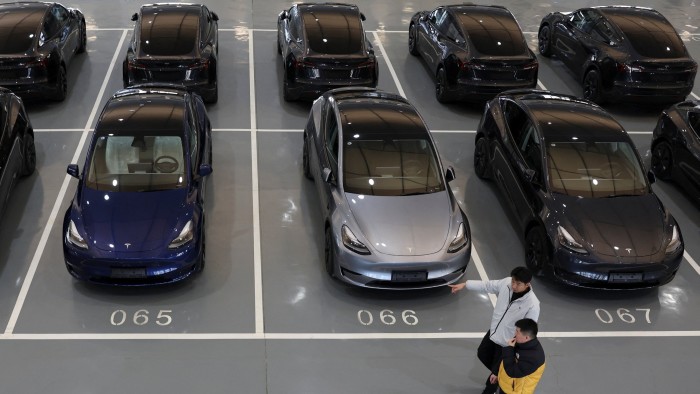Unlock the Editor’s Digest for free
Roula Khalaf, Editor of the FT, selects her favourite stories in this weekly newsletter.
Tesla is taking the EU to court over tariffs the bloc imposed on imports of electric vehicles from China.
The European Court of Justice published confirmation of the case, filed by Tesla’s Shanghai subsidiary, on its website on Monday morning without giving further details.
The US company follows Germany’s BMW and several Chinese carmakers that have filed claims against the EU.
In October the EU imposed anti-subsidy tariffs of 7.8 per cent on Tesla and up to 35.3 per cent on other Chinese electric vehicle imports. These were in addition to a 10 per cent standard import tariff for the industry.
The case is the latest confrontation between the EU and Tesla’s billionaire boss Elon Musk, an adviser to US President Donald Trump.
Musk is an outspoken critic of EU technology regulation and has backed the far-right Alternative for Germany party in the country’s election campaign.
New Tesla registrations fell 13 per cent year on year to 242,945 vehicles in 2024, according to Acea, the European car industry body. Musk’s political activism has been blamed for deterring some drivers from buying a Tesla, though it has made others more likely to buy one.
About a fifth of all electric cars sold across the EU last year, or 300,000 units, were built in China.
Transport and Environment, a consultancy, found that Tesla accounted for 28 per cent of Chinese-made EVs imported into the EU in 2023 — more than any other brand.
An EU trade investigation found that carmakers had benefited from soft loans, cheap land deals and subsidies for suppliers such as steelmakers.
Tesla had the lowest tariff as it received the smallest amount of support.
European Commission trade spokesperson Olof Gill said last week after the initial challenges were filed by BMW and other carmakers: “We’re ready. We’re a rules-based club here in the EU. If they want to take us to court, they can take us to court.”
The filing gave no details about Tesla’s argument. The case against the European Commission will be heard at the General Court, the EU’s second-highest court, and the verdict can be appealed against to the ECJ. The process could take around 18 months.
Tesla executives have said they are adjusting their import policy from China to respond to the EU tariffs. The company currently exports Model 3 vehicles from Shanghai to EU, while it produces the Model Y in Berlin.
Read the full article here

